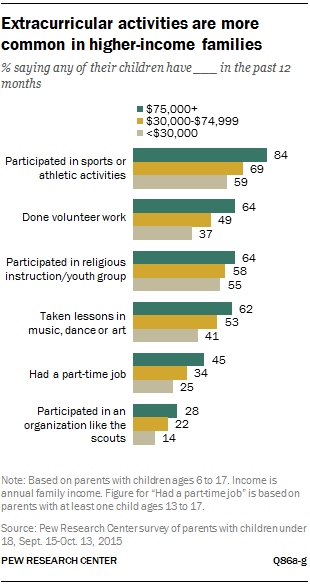You’re registering your child for a new extracurricular activity when you notice the ‘donate’ button. To give or not to give, that is the question, especially in an era when so many organizations – including schools themselves – already have their hands out.
Well friends, we’re here to tell you why donating to extracurricular clubs is a smart investment – in other people’s kids, yes, but also in your own kids, your community, your nation.
In fact, given the far-reaching implications of such donations, we believe contributions to extracurricular organizations are one of the wisest forms of philanthropy available in the U.S. today.
Here’s why.
Participation in Extracurriculars is a Smart Investment
We know, thanks to gobs of research and even greater amounts of anecdotal evidence and first-person testimony, that extracurriculars are good for kids.
And by good for kids, we mean really good, because those benefits extend well beyond childhood and into the participants’ adult years. Examples of their benefits include:

- Participation in extracurriculars is a better predictor of a child’s future earnings potential and educational achievement than academic performance or test scores.
- Those school grades and test scores are made stronger by – you guessed it – participation in extracurricular activities.
- Extracurriculars make kids more confident by improving their social engagement, problem-solving, leadership, networking, and time management skills.
- Kids who regularly participate in extracurriculars are less likely to engage in unhealthy, dangerous, or self-defeating behaviors.
- They’re also more likely to complete high school.
- They will enjoy better chances at attending the university of their choice.
- Post-college, they’ll enter into stronger interpersonal relationships have better job prospects.
So effective are these programs in helping kids, that the entire nation of Iceland used extracurriculars to help transform its kids from Europe’s worst, in terms of substance abuse, smoking, etc., to its best.
The Cost of Non-Participation
Conversely, kids who fail to participate in extracurriculars – most often because they come from low-income homes that simply cannot afford these clubs and camps – miss out on all these advantages. And that’s a double whammy for these kids, because research shows they’re already starting out with serious handicaps relative to their more financially secure peers.

Research shows that low-income kids are more likely to grow up in unstable homes, face academic challenges, and witness violence. Because of these challenges, these kids also are more likely to struggle in the classroom, to quit high school, and to engage in unhealthy, dangerous, and self-defeating practices.
And those practices, in turn, make it more likely that some of these kids will end up on the wrong side of the law, where they become a burden not just to themselves, but to their families, their communities, their nation.
Again, as Iceland’s efforts over the past 20 years proved, all kids, regardless of background, are happier, healthier, and better grounded when offered positive alternatives and outlets for their interests and energies.
Giving a Little Extra for Extracurriculars
So if the kids who could most benefit from extracurricular activities don’t enjoy equal access, what can be done?
That’s where you come in. Even if you only contribute a few dollars during your child’s registration process, those funds, in the aggregate, enable clubs and camps to defray at least some of the costs so that less fortunate kids can participate.

Moreover, those dollars you donate can make an enormous difference in the lives of these kids – a difference greater even than for your own child.
Research has shown, for example, that extracurricular participation by low-income and urban middle schoolers resulted in better academic performance, which in turn leads to better higher education and professional prospects.
Similarly, a study by Northeastern University showed that girls who participate in extracurricular sports are less likely to engage in delinquent behavior. For boys, the same results were found through participation in faith-based and community services.
And consider, for a moment, that it costs each state, on average, $407.58/day to lock up a juvenile delinquent (that’s nearly $150,000 per year). Or that by locking up that child, the state makes it far more likely that child will never graduate high school, suffer from a drug dependency, or commit a more serious crime.
Give a Little, Get a Lot
We’re not trying to make extracurriculars out to be some kind of panacea or to suggest that kids who play soccer or attend a theatre camp are guaranteed a fabulous life. Nor are we arguing that kids who don’t engage in extracurriculars will automatically end up leading terrible lives or behind bars.
What we are pointing to, however, is the direct correlation between kids’ participation in extracurricular activities and the many, many benefits that come with them – benefits that kids from more difficult backgrounds could especially use.
“Given the advantages of extracurriculars as well as the types of hardships associated with children from low-income families, exposure to these activities could have a pronounced impact on disadvantaged youth,” writes Alia Wong for The Atlantic.
So folks, the next time you register your child for a club, camp, or extracurricular activity, please consider making a donation. If the club doesn’t include such opportunities, recommend they include them. Those dollars could truly change a life right there in your own community.
